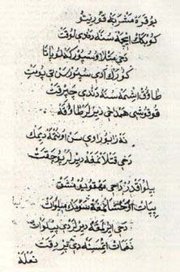Bosnian language
|
|
| Bosnian (Bosanski) | |
|---|---|
| Spoken in: | Bosnia and Herzegovina, and others |
| Region: | The Balkans |
| Total speakers: | 2.5 million (25M) |
| Ranking: | Not in top 100 (44) |
| Genetic classification: | Indo-European |
| Official status | |
| Official language of: | Bosnia and Herzegovina (one of three, mainly used by Bosniaks) |
| Regulated by: | ? |
| Language codes | |
| ISO 639-1 | bs |
| ISO 639-2 | bos |
| SIL | bos |
| See also: Language – List of languages | |
The Bosnian language (Bosanski jezik) is one of the standard versions of the Central South Slavic diasystem, formerly known as Serbo-Croatian.
The language is used primarily by Bosniaks and Bosnians in Bosnia and Herzegovina and elsewhere. It is based on the Western variant of the Shtokavian dialect and uses the Latin alphabet.
The name for the language is a controversial issue. Croats and Serbs in Bosnia and Herzegovina call their language Croatian and Serbian. The constitution of Republika Srpska, where the language is also official, refers to the language as "Language spoken by Bosniaks" ("Jezik kojim govore Bonjaci"), as does the government of Serbia.
The name Bosnian language is the commonly accepted name among Bosniak linguists, and the name used by the ISO-639 standard. Bosniak language is the prescribed name of the language in Serbian. Pre-eminent Croatian linguists (Radoslav Katičić, Dalibor Brozović, Tomislav Ladan) also consider that the adequate name for Bosnian language would be «Bosniak» rather than «Bosnian», since the appellation Bosnian refers to the whole land of Bosnia, therefore implicating that «Bosnian» is the national standard language of all Bosnians- and not only Bosniaks. Although there is no publicly formulated Croatian policy towards this question, in official Croatian publications (for instance, in Croatian Encyclopaedia issues or University manuals), the language of Bosniaks is invariably referred to as Bosniak.
History
The irony of the Bosnian language is that its speakers, Bosnian Muslims or Bosniaks, are, on the level of colloquial idiom, more linguistically homogenous than either Serbs or Croats, but have failed, due to historical reasons, to standardize their language in the crucial 19th century. The first Bosnian dictionary, a rhymed Bosnian-Turkish glossary authored by Muhamed Hevaji Uskufi, was composed in 1631.
But, unlike Croatian dictionaries, which were written and published regularly, Uskufi’s work remained an isolated foray. At least two factors were decisive:
- The Bosnian Muslim elite wrote almost exclusively in Oriental (Arabic, Turkish, Persian) languages. Vernacular literature, written in modified Arabic script, was thin and sparse.
- The Bosniaks' national emancipation lagged behind that of the Serbs and Croats, and since denominational, rather than cultural or linguistic issues played the pivotal role, a Bosnian language project didn't arouse much interest or support.
Prescriptions for the language of Bosnian Muslims in the 19th and 20th centuries were written outside of Bosnia and Herzegovina. Probably the most authentic Bosniak writers (the so-called "Bosnian-Muslim revival" at the turn of the century) wrote in an idiom that is closer to the Croatian form than to the Serbian one (western Štokavian-Ijekavian idiom, Latin script), but possessed unmistakably recognizable Bosniak traits, primarily lexical ones. The main authors of "Bosnian Muslim renaissance" were polymath, politician and poet Safvet-beg Bašagić, "poete maudit" Musa Ćazim Ćatić and storyteller Edhem Mulabdić.
In the days of Communist Yugoslavia the lexis was Serbianized but the Latin script became dominant; the official name was Serbo-Croatian. After the collapse of Yugoslavia Bosniaks remained the sole inheritors of the Serbo-Croatian hybrid in Bosnian variant and are trying to reshape it, under the new name of Bosnian, into a distinct national/ethnic standard language.
On a formal level, the Bosnian language is beginning to take a distinctive shape: lexically, Islamic-Oriental loan words are becoming more frequent; phonetically and phonologically, the phoneme "h" is reinstated in many words as a distinct feature of Bosniak speech and language tradition; also, there are some changes in grammar, morphology and orthography that reflect Bosniak pre-WWI literary tradition, mainly that of the Bosniak rebirth at the beginning of the 20th century.
External links
- Ethnologue report for Bosnian (http://www.ethnologue.org/show_language.asp?code=SRC)
- Bosnian language (http://www.bosnianlanguage.com/)
- Learn Bosnian language: Basic phrases (http://home.freeuk.com/iandart/)
- The Oslo Corpus of Bosnian Texts (http://www.tekstlab.uio.no/Bosnian/Corpus.html)bg:Босненски език
bs:Bosanski jezik cs:Bosenština de:Bosnische Sprache fr:Bosniaque nl:Bosnische taal hr:Bošnjački jezik sl:bošnjaščina sr:Босански језик sv:Bosniska

